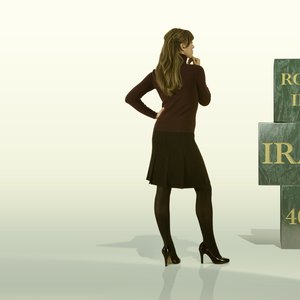
Individual retirement accounts and 401(k) retirement plans both allow taxpayers to set aside money for future retirement income with some tax advantage. Either can be a traditional plan whose contributions are deducted from taxable income or a Roth version, funded with after-tax money but allowing tax-free withdrawals at retirement. IRAs are personal accounts, while 401(k) plans are employer-sponsored and usually include employer matching contributions.
Defined Contributions
Both IRAs and 401(k) plans are defined contribution programs. The amounts put into the accounts are defined by Internal Revenue Service regulations and employer plan rules for 401s. Money is invested and earnings are not taxed until they're withdrawn, but benefits aren't guaranteed: They depend on the success of the investments.
Contribution Limits
Contributions to IRAs are limited in 2013 to $5,500 a year, plus another $1,000 "catch-up" for those over age 50, while those to a 401(k) may go up to $17,500, with a combination of deferred pay for employees and any employer match. A 401(k) also has a catch-up allowance, but it is $5,500 a year as of 2013. The limits are the same for both traditional and Roth versions.
Income Restrictions
Traditional and Roth IRAs have different income restrictions. A couple filing a joint tax return can't deduct traditional contributions if income is over $115,000 and the spouse contributing is covered by workplace retirement. It's $188,000 if the contributor isn't covered by workplace retirement or if the contribution is to a Roth IRA. The annual compensation limit for participation in a 401(k) is $255,000.
Withdrawal Rules
Both traditional IRAs and 401(k)s fall under the 59 1/2 and 70 1/2 withdrawal rules. A contributor can't withdraw funds without a 10 percent penalty plus ordinary income tax before age 59 1/2, unless there is a special hardship distribution. Regular withdrawals must start at 70 1/2, based on the amount in the account and life expectancy.
Investment Options
IRA investments are a matter of personal choice and can include stocks, bonds, mutual funds, annuities or other options. An employer chooses 401(k) investment options, which usually are limited. An employee can have both a 401(k) and an IRA, but contributions to the IRA will be limited by participation in a workplace retirement plan.
References
- IRS: Types of Retirement Plans
- Department of Labor: Types of Retirement Plans
- Investor Guide: Types of Retirement Plans
- National Endowment for Financial Education: Planning for Retirement
- Find Law: Types of Retirement Plans
- Financial Web: Various Types of Retirement Plans
- Internal Revenue Service (IRS). "IRA FAQs - Distributions (Withdrawals)." Accessed April 9, 2020.
- Internal Revenue Service (IRS). "Income ranges for determining IRA eligibility change for 2021." Accessed Nov. 4, 2020.
- Internal Revenue Service (IRS). "Choosing a Retirement Plan: SEP." Accessed April 9, 2020.
- Internal Revenue Service (IRS). "2021 Limitations Adjusted as Provided in Section 415(d), etc." Accessed Nov. 4, 2020.
Resources
Writer Bio
Bob Haring has been a news writer and editor for more than 50 years, mostly with the Associated Press and then as executive editor of the Tulsa, Okla. "World." Since retiring he has written freelance stories and a weekly computer security column. Haring holds a Bachelor of Journalism from the University of Missouri.

